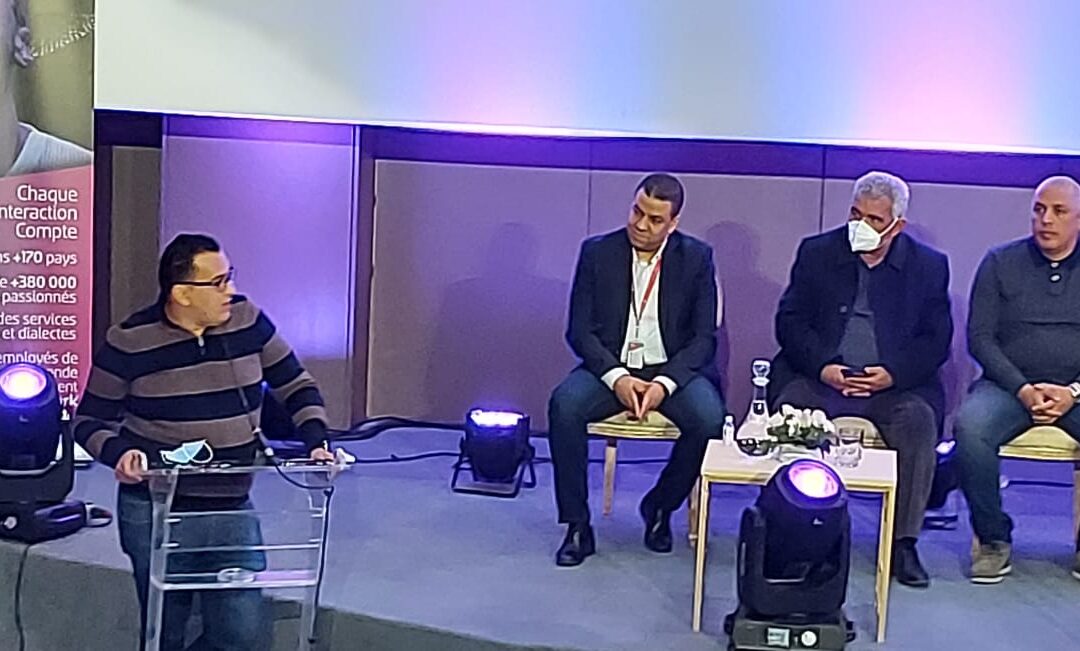
Feb 15, 2022
Some 3,800 call center workers at Teleperformance in Tunisia won a 13.8 percent wage increase and other key contract gains after staging actions and planning a strike in Tunis, the capital, and other cities.
Represented by the Tunisia General Labor Union (UGTT), the workers negotiated an additional three days paid sick leave and increases in funding for tuition, food vouchers and their social welfare fund, which is administered by the government and includes pensions, maternity benefits, medical benefits and unemployment compensation.
The contract goes into effect immediately for the workers, 80 percent of whom are young and the majority of whom are women.
Teleperformance, a France-based multinational with more than 380,000 employees in 83 countries, made $372 million in profits in 2020. Yet poor and unsafe working conditions at its operations in several countries led workers in France, Morocco and Tunisia to strike last year. Workers say they were not paid if they refused to work without sufficient personal protective equipment, including masks, and pointed to inadequate social distancing and lack of sanitary measures for shared headphones and workspaces.
The UGTT, which now represents 12,000 workers at Teleperformance and other tech centers, has helped 5,000 tech center workers form unions in the past two years.
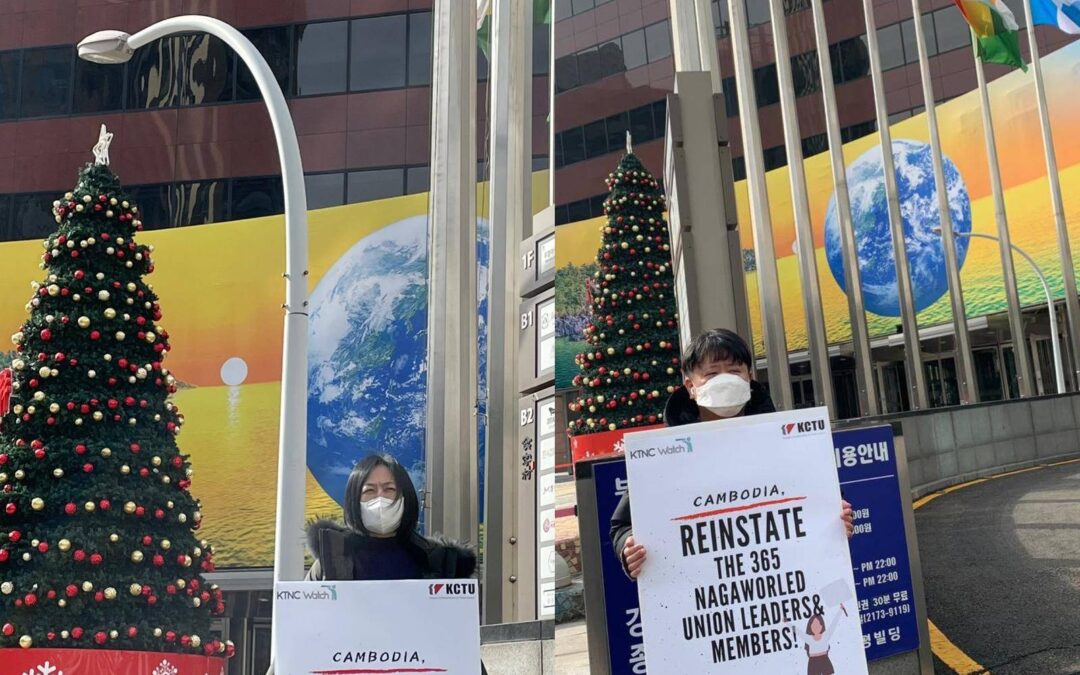
Feb 10, 2022
Eight union leaders jailed for peacefully walking a picket line at NagaWorld Hotel and Casino in Cambodia have been denied pre-trial release, and government officials are now using the COVID-19 pandemic to further interfere with workers’ right to assemble, according to the Labor Rights Supported Union of Khmer Employees of NagaWorld union (LRSU).
The imprisoned union leaders, including union president Sithar Chhim, who was violently taken away by plain clothes police while attempting to join her colleagues on the picket line, say they do not have enough water and are not allowed to contact their families.
During a raid on union offices December 31, police arrested union leaders and seized computers and phones. The leaders are charged with incitement, which carries a sentence of up to five years in prison.
(Send a message to the Cambodian prime minister asking for union leaders’ immediate release.)
Crackdown on Strikers
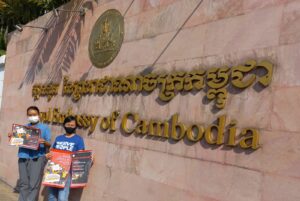
Activists in Bangkok stand in support of striking NagaWorld workers at the Cambodian Embassy, Credit: Thai labor activists
As workers entered their tenth week walking the picket line February 4, the government demanded the strikers leave to take COVID-19 tests, despite the lack of mass COVID-19 testing elsewhere in Cambodia. Recent photos show government officials at maskless social events where COVID-19 tests were not required.
After workers refused to leave the picket line, authorities sent doctors and medical staff to test those on strike, not allowing them to leave until they took a test. More than 700 workers have now been tested, and with four positive COVID-19 cases, LRSU has since suspended the strike for 10 days.
Three NagaWorld workers were detained for allegedly obstructing implementation of the Law on Measures to Prevent the Spread of COVID-19 and other Serious, Dangerous and Contagious Diseases. They were interrogated for days and must appear before a court this week. The LRSU is calling out the government for using legal intimidation to stop a peaceful strike.
In addition, a striker’s husband was detained and taken to the police station because he had been taking photos of authorities. He says he was forced to sign an agreement promising not to take photos of authorities in the future before he was released.
Global Support for NagaWorld Workers
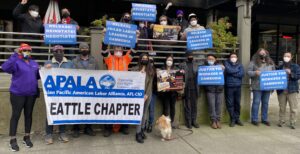
Members of the Asian Pacific American Labor Alliance in Seattle joined solidarity events to support NagaWorld workers. Credit: APALA, Seattle Chapter
Thousands of slot machine workers, dealers, housekeepers and technicians went on strike in late November, demanding the reinstatement of 365 employees who were fired in April. While management asserts the layoffs were due to COVID-19, union leaders say those laid off were all union leaders and activists.
Workers also want the company to provide seniority bonuses and pay, per the law, and a 7 percent raise on their base salary to keep up with inflation. They also are calling for NagaWorld to stop exploiting workers under the premise of internships.
The workers’ strike has gained global support, as global unions, human rights organizations and others have demanded they be allowed to freely exercise their rights to peacefully assemble, strike and form unions.
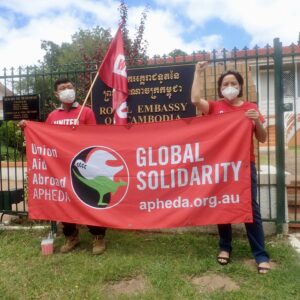
In Canberra, Australia, activists joined the Day of Action in support of NagaWorld workers. Credit: APHEDA
During a ”Global Day of Action” February 7, solidarity events took place at Cambodian embassies and consulates in 11 cities on four continents. The action coincided with NagaCorp’s board meeting where, despite the corporation’s claims it fired workers due to slowing business during the pandemic, company leaders stressed it is a very strong financial position, with higher than predicted revenue, and that the business is returning to profitability
Global Day of Action participants submitted letters to the consulates that condemned the actions of NagaWorld and the Cambodian government, reiterated the union’s demands and expressed solidarity with LRSU and its members. The Asian Pacific American Labor Alliance, Solidar Suisse, Building and Wood Worker’s International, IUF global union, APHEDA and other unions and labor rights organizations around the world, coordinated the actions in seven countries.
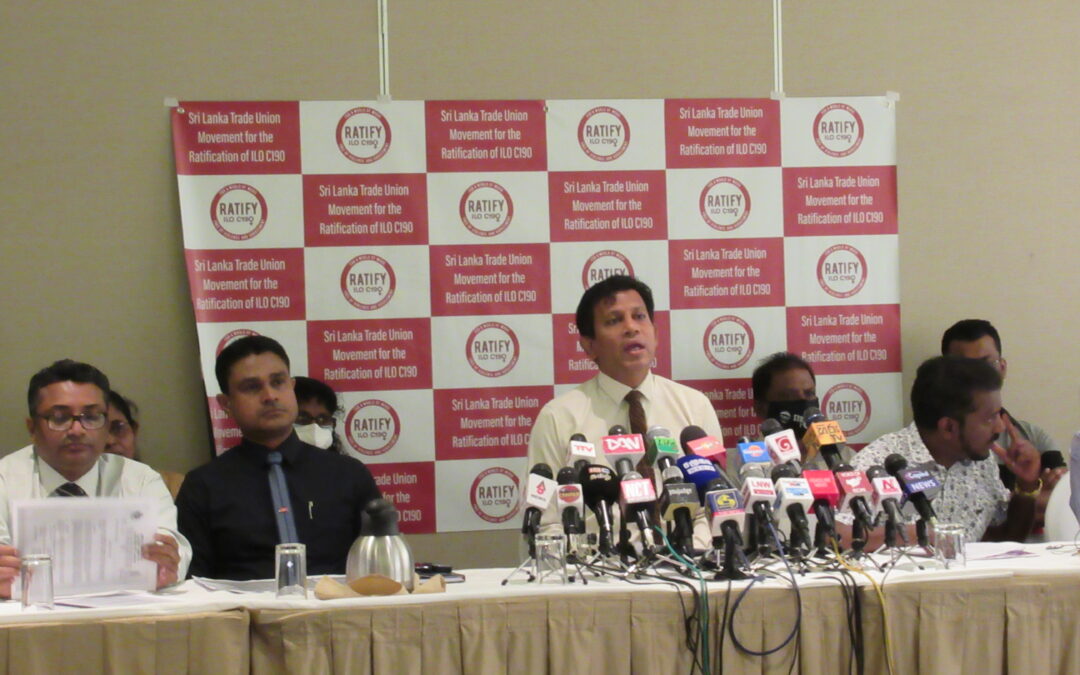
Feb 7, 2022
Unions in Sri Lanka are urging the government to follow through with its promise to ratify a global treaty to end gender-based violence and harassment in the world of work by March 2022.
The Sri Lanka Trade Union Movement for the Ratification of ILO C190 in Sri Lanka, comprised of 17 trade union leaders from the public and private sectors, held a press conference in recent days to call out the government for deliberately delaying the ratification process.
International Labor Organization Convention 190 (C190) is the first international treaty that addresses violence and harassment at work. The ILO adopted it in 2019 during its annual meeting in Geneva.
“There is no point in raising your hand in Geneva, only to lower your hand in Sri Lanka,” Saman Rathnapriya, chairman of the Government Nursing Officers Association said at the press conference.
“Create a proper working environment in the country. A conducive working environment does not exist in this country.”
Union leaders noted that Sri Lanka’s Labor Minister Nimal Siripala De Silva had promised ratification by March 2022 during a March 2021 Women’s Day event organized by the National Union of Seafarers Sri Lanka (NUSS), and in numerous other public venues.
Ten countries have ratified the convention.
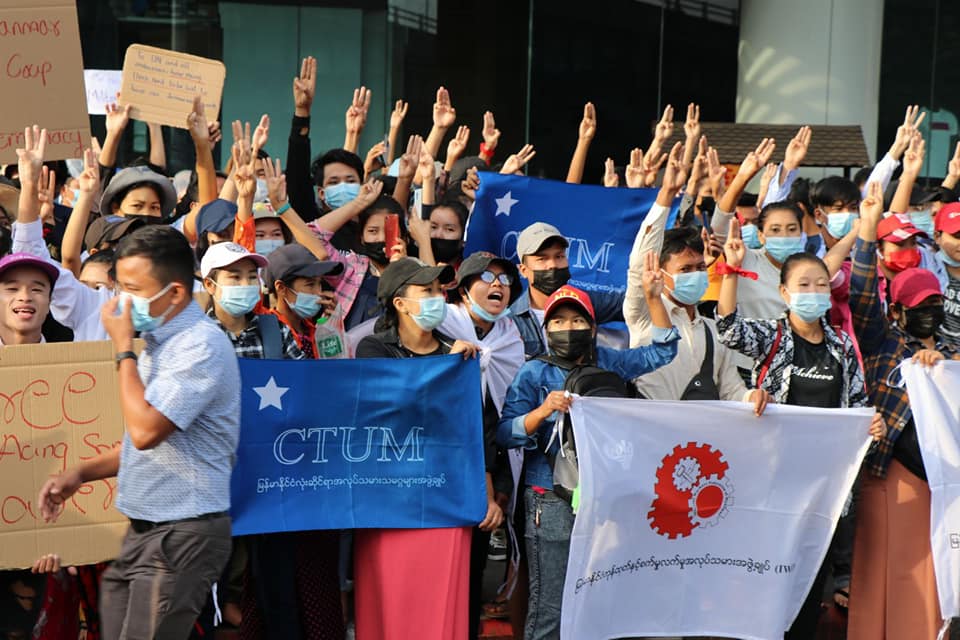
Feb 1, 2022
As Myanmar’s military junta marks the first year of its overthrow of the country’s democratically elected government February 1, delegates to a national unity assembly seeking to establish civilian control and return the country to democracy elected a five-member presidium that includes union leader Phyo Sandar Soe.
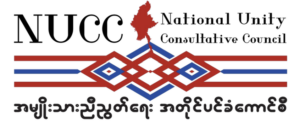 Nearly 400 delegates gathered virtually for the First People’s Assembly of the National Unity Consultative Council (NUCC), where they elected Sandar, assistant general secretary of the Confederation of Trade Unions Myanmar (CTUM). She is the only woman and is the youngest person elected to the presidium.
Nearly 400 delegates gathered virtually for the First People’s Assembly of the National Unity Consultative Council (NUCC), where they elected Sandar, assistant general secretary of the Confederation of Trade Unions Myanmar (CTUM). She is the only woman and is the youngest person elected to the presidium.
(Take action to support a return to democracy in Myanmar.)
Delegates to the January 27–29 assembly included a broad spectrum of political parties, civil society organizations, ethnic states and organizations calling for unity and support for the “Spring Revolution.”
In a statement, the assembly strongly condemned “the actions of the terrorist military junta that includes the widespread and deliberate arrest, torture and murder of innocent people … breaching international human rights laws which includes Geneva Conventions, crimes against humanity and war crimes and genocide.”
Myanmar Junta’s One-Year Record: Thousands Killed, Tortured
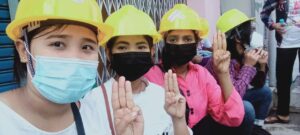
Workers–women in particular–took an early lead in the protests against the Myanmar coup, with the country’s 450,000 garment workers especially active. Credit: CTUM
An estimated 1,500 people have been killed since the military coup, and nearly 12,000 people imprisoned, most tortured. The military has especially targeted union leaders, arresting dozens, and many have fled the country or are in hiding. Workers–women in particular–took an early lead in the protests, with the country’s 450,000 garment workers especially active in organizing civil disobedience actions and shutting down factories. They have asked international corporate fashion brands to cease doing business in Myanmar until democracy is restored.
Workers today staged a silent strike across the country, to mark the anniversary in defiance of military brutality.
The assembly also is calling for the release of all political prisoners and protesters, and is urging the international community to recognize the National Unity Government (NUG) as the country’s only legitimate government. The NUG includes Aung San Suu Kyi, who headed Myanmar’s government before the coup and who has been arrested and jailed by the military junta.
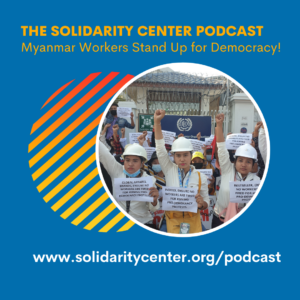 “We are facing a bloody crackdown, but all people protect each other. We are finding solutions to fight back,” Sandar said on a Solidarity Center Podcast last year.
“We are facing a bloody crackdown, but all people protect each other. We are finding solutions to fight back,” Sandar said on a Solidarity Center Podcast last year.
“That’s why I want to tell our brothers and sisters to endure this duration because we have very high motivation to fight back against the junta.” Sandar, a former garment worker, spoke from a safe house with podcast host and Solidarity Center Executive Director Shawna Bader-Blau.
Workers across the country are struggling to support themselves, as some 1.6 million jobs were lost in Myanmar in 2021, with women workers hit especially hard. Working hours are estimated to have decreased 18 percent in 2021 relative to 2020, equivalent to the working time of at least 3.1 million full-time workers. Nearly 800,000 people have been displaced and an estimated 14.4 million people, including 5 million children, are in need of humanitarian assistance.
Sharan Burrow, general secretary of the International Trade Union Confederation (ITUC), and Thomas Andrews, UN Special Rapporteur on the Situation of Human Rights in Myanmar spoke to delegates to convey their support.
‘Investing in Myanmar Means Fuels Military Brutality’
Union leaders in Myanmar have been urging international corporations to pull support from the government. “If you invest in Myanmar, your investment money will go to the military regime,” Sandar said on the Solidarity Center Podcast. “And then the military regime, with your money, they will keep controlling the country and they will buy guns and weapons, and then they will kill us.” Unions and other civil society organizations around the world, including the Solidarity Center, have backed a statement urging international brands not to invest in Myanmar.
“There’s no excuse for anyone who does business with this regime, and there’s no excuse for backing the bloodshed with weapons,” Burrow said on the anniversary of the coup. “That’s why we are calling on the UN Security Council to enforce an arms embargo on Myanmar and enforce the General Assembly’s resolution 75/287 with the member states.”
Two energy firms, Total Energies and Chevron announced last week they were pulling out of Myanmar, citing widespread human rights abuses and deteriorating rule of law. Yet many other multinational corporations have not withdrawn.
Together with the United Kingdom and Canada, the U.S. Department of the Treasury’s Office of Foreign Assets Control (OFAC) on January 31 announced financial sanctions against seven individuals and two entities connected to Myanmar’s military regime. The action follows similar U.S. sanctions imposed last year.
Despite the hardships, union activists and other NUCC members are standing up for the restoration of democracy and fundamental human rights, with the NUCC vowing to “continue the fight for the elimination of all forms of dictatorship including military dictatorship,” and build “a federal democracy union which fully guarantees democracy, national equality and self-determination with collective leadership and collective strength.”
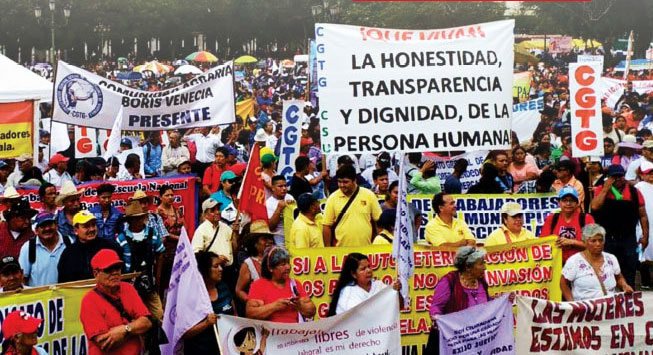
Jan 28, 2022
The Inter-American Court of Human Rights this week issued an historic ruling that affirmed a worker’s right to strike.
The case arises out of a collective dispute in 1996 when efforts by the Union of Workers of the Judicial Body to negotiate a new collective agreement failed. The union went on strike in March 1996, having complied with the procedures but before the General Inspectorate of Labor had confirmed two-thirds of the workers supported the strike—the legal requirement in the Labor Code. The Attorney General obtained an injunction declaring the strike illegal, and the employer subsequently fired those who had participated in the strike. In 1999, the Supreme Court confirmed the dismissals, leading the union to take the matter to the Inter-American Commission in 2000. The commission rendered its decision on the merits in 2019, and the matter was referred to the court in 2020 for a final, binding decision.
Unions in Guatemala and throughout Latin America are hailing the decision. César Guerra, secretary of Labor and Conflicts at the Union of Banana Workers of Izabal-SITRABI, calls the court decision “an important precedent for the country’s labor judges to rule in accordance with our rights, especially on a subject as stigmatized as the strike.”
The decision “sets an important precedent for the country’s labor judges to rule in accordance with our rights, especially on a subject as stigmatized as the strike,” he says. Exploitation and abuse of worker rights is widespread on banana plantations throughout Guatemala.
The Inter‑American Court of Human Rights is an autonomous judicial institution created to apply and interpret the American Convention on Human Rights. The seven court members come from countries that comprise the Organization of American States.
“This is an important decision on the right to strike, not only for Guatemala, on which it is directly binding, but also because it sets an important precedent for the rest of the region and the world,” says Jeff Vogt, director of the International Lawyers Assisting Workers (ILAW) network. “Importantly, the court ordered Guatemala to amend its labor laws concerning the right to strike to prevent repetition.”
ILAW submitted an amicus brief in support of the workers and focusing on the right to strike, an internationally recognized right protected by International Labor Organization (ILO) Convention 87 and now by the American Convention. ILAW was established in 2018 by the Solidarity Center.
The decision was hailed by Guatemalan unions. “As the SITRABI union, we feel extremely satisfied with the ruling of the Inter-American Court in favor of Guatemalan workers and trade unionism, which, despite arriving 25 years later, sets an important precedent for the country’s labor judges to rule in accordance with our rights, especially on a subject as stigmatized as the strike. And we hope, as stated in the judgment in its Reparations section, that the pertinent steps be taken to ensure that the ‘guarantees of non-repetition’ are fulfilled and that the right to strike of Guatemalan workers is effectively respected,” explains César Guerra, secretary of labor and conflicts at the Union of Banana Workers of Izabal.
No Law Can Prevent Basic Right to Strike
In its ruling, the court explained that the right to strike is protected by ILO Convention 87—a point that employers have been contesting since 2012. It went further to say that the right to strike is a general principle of international law. Further, the right to strike is directly justiciable under the American Convention and the obligation is immediately enforceable.
With regard to Guatemalan labor law, the court explained that “the conditions and prerequisites that the legislation establishes for a strike to be considered a lawful act must not be complicated to the point of making a legal strike impossible in practice.” The court further explained that, “While conditions for exercising the right to strike can be laid down in the framework of collective negotiation, these conditions must be reasonable and at no time should affect the essential content of the right to strike, or the autonomy of trade union organizations.”








 Nearly 400 delegates
Nearly 400 delegates 

